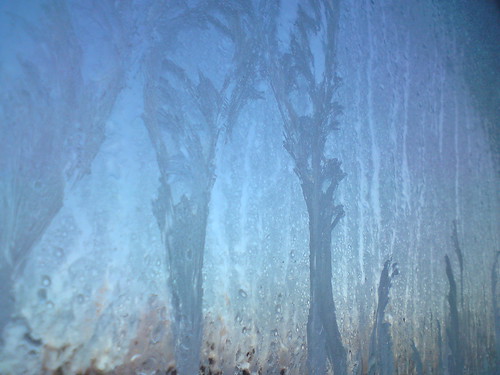It's been relatively warm in the days here when the sun is out, but the mornings can still bring a canal solid enough for ducks to walk across - just! - and more icy windows to wake up to...

When I haven't been painting walls and doors inside Wils, I've been looking into a number of cunning projects on the technological front... Recently seeing the fantastic Ponyo on the big screen got me scouting the internet for information on 'pop pop' engines, such as those featured in the film. Despite a wave of naysaying concerning their potential for use outside of retro toy manufacture, I eventually stumbled onto the work of Peter Payne, and his pulsejets in particular - in short the pulsejet (the technical name for a pop pop engine) is just about the simplest engine ever devised, and by way of the best introduction to their operation is such in toys - search youtube, there are loads of videos of them in use. Peter Payne worked at developing their use in full sized boats, though from what I've read so far his experiments took place in small rowing boats on the whole. It seems that once you scale up the engine, the physics that allowed the water present in the engine to act as piston, working fluid, exhaust propellant etc all in one broke down and the whole subject requires a lot more work. Even multiplying the number of small engines you have wouldn't take you far in a narrowboat weighing in at around ten tons. His work can be found here:
Peter Payne's Pulsejets
So the investigation into an alternative propellant for Wils goes on... I'm not happy continuing to use a diesel engine for a number of reasons, and I'm not satisfied to give up looking for an alternative just because they're unusual. On this topic I was reminded that narrowboats powered by electric motors save 25% on their BW license fees every year... And with the production/acquisition/creation of wood-fired generators and wind turbines within the grasp of amateur wizards and inventors - I can see a way of making this work! More on that as it develops...
The space I will gain from removing the sink and tabletop in the bedroom is begging me to install a piano in it, but I've not seen one quite small enough yet...
Happily it turns out that I didn't interrupt a live radio interview that Athina (chairman of the BCS) was giving on her narrowboat, Brown Trout, when they came past me at Campbell Park! I caught a glimpse of them going past and decided the wisest course of action was to tear down the boat, throw open the stern door and yell "Hello!" mid-interview! Oops. I think the reporter was a little baffled, probably writing me off as some kind of one-man Parks Trust/Waterways Cheer Squad. I'm just glad Athina recognised me!
Hello! Very interested to read about your thoughts on electric motors... maybe they will install a few electric points for charging along the canal while they position loads for cars within the city?! Will be watching these developments with interest :-) and we shall look forward to reading the Navigator now we are officially boat owners ourselves (shall be looking out for you on the waterways :-)
ReplyDelete